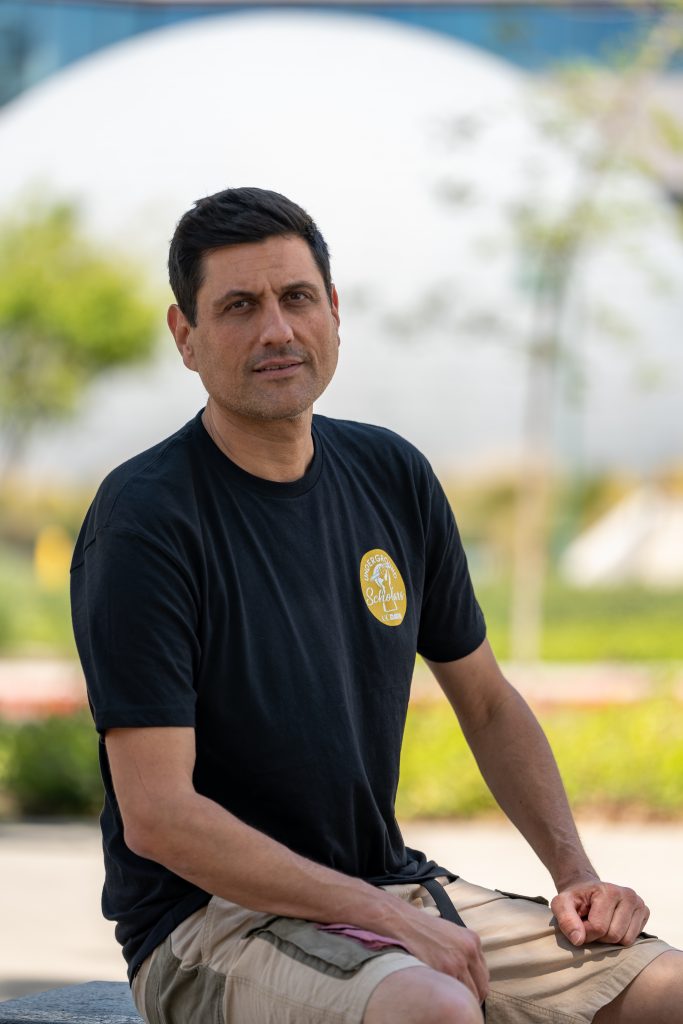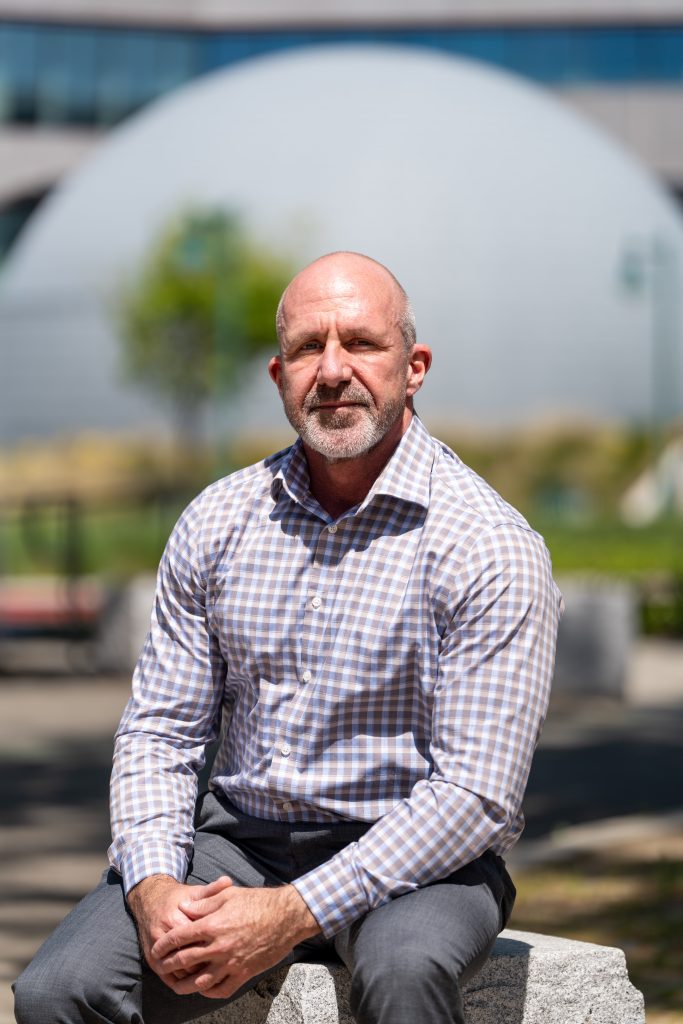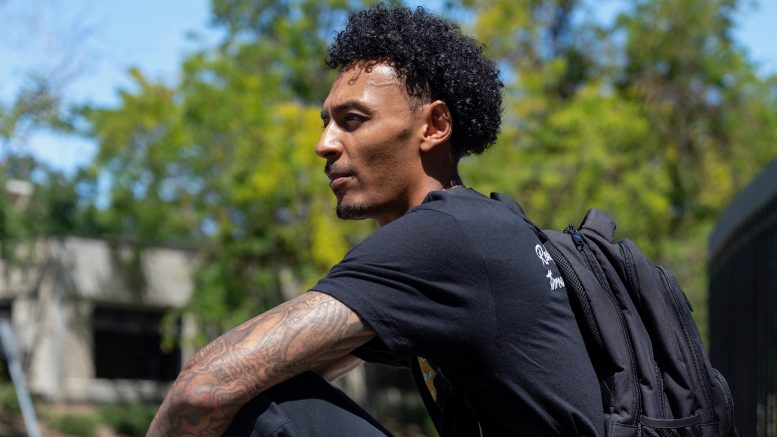By Russell Nichols
Burning up on a roof in Rancho Cordova can give one perspective. Marce Bushey, for one, learned 12-hour shifts installing solar panels under the relentless Central Valley sun wasn’t the future he saw for himself.
At the time, he was fresh out of California’s state prison system. Bushey was paroled in March 2022 after about nine years of incarceration. The solar job paid well enough, but cost him in other areas. He had a long commute from Davis. He wasn’t eating. He felt crankier when he got home to his 9-year-old son and 10-year-old daughter. Plus, he had no time for school.
“I really want to graduate, pass my classes,” Bushey says two years later, “show my kids this is possible for all of us.”
Possibilities opened up for Bushey when he connected with the Underground Scholars Program at UC Davis less than a week after his release. It was a student-run club back then, but in January, with funding support from the state, USP officially launched on campus. The peer support program, which currently has close to 30 members, helps students who have been incarcerated or negatively impacted by the system, whether through family, finances or the law itself.
USP offers guidance to students through services such as outreach, filling out applications, financial aid, connections to resources, and others. With a focus on education, employment and empowerment, the program aims to “reverse the school-to-prison pipeline by actively dismantling systems of oppression and providing a layer of support for our students on campus,” according to the USP vision.
“Life’s going to pull you in a lot of directions when you come home,” says Joshua “Gunner” Johnson, who came on as USP’s program director in November. “So we want to make sure that they have the support and focus to help them continue with their education and persist to their degree.”
First launched in 2013 by UC Berkeley students, Underground Scholars programs have expanded to nine UC campuses. Other prison-to-school programs in the state include Project Rebound, which serves California State University campuses, and the Rising Scholars Network at California Community Colleges. Johnson, who was incarcerated for 18 years, found support from Project Rebound at Sacramento State.

The program gave him a small stipend ($100 for textbooks, $50 for food every semester). He was encouraged to moderate a panel discussion, which helped him conquer his fear of public speaking. Above all, it was the community, he says, that helped him get acclimated to the academic and professional world after being incarcerated for so long.
“I was gone almost two decades, so coming home everything had changed,” Johnson says. “My brother gave me an iPhone the day I got out and I didn’t know how to turn it on. I had a pager when I went to prison.”
Times have definitely changed. Current USP students receive a stipend of up to $1,000 a quarter for living expenses. Other stipends may be given for unpaid fellowships and internships, and also health and wellness courses, such as yoga classes or acupuncture. Continuing to build the community at UC Davis and beyond is critical, says Trevor Clark, program coordinator. Recently he planned a bowling event bringing together students from the three prison-to-school programs in the county.
“We’re trying to foster community, not just within our immediate network, but having events where all three groups come together, so that there is overlap,” says Clark, who earned two associate degrees during nearly 10 years in a Nevada state prison, then transferred to UC Davis and graduated with a bachelor’s degree in linguistics in 2017. “Maybe you’re at Sac State and you want to get your master’s or Ph.D. [at UC Davis] or you’re a Rising Scholar at a community college and you’re looking to go to either Sac State or UC Davis, then you have connections and can build community.”
Another of the program’s long-term goals is housing. This is a challenge in Davis with limited new development. When Johnson was working with Project Rebound, the team was able to get a $500,000 grant and additional support from the Sacramento State campus president to buy and renovate two houses to provide a space for the students. Ideally, Johnson says, something similar could be done at UC Davis. They’ve got their eyes on a 10-bedroom house for rent, which can comfortably sleep 14.
“I don’t like people having to share space especially since you’ve come out of an environment where you likely had a cell and you’re ready for your own space,” he says. “But these rooms are pretty big and we could probably partition them off. One of our north star goals is to have housing to not only provide living [spaces] for our students, but another place where we can hang out, build community, have barbecues and stuff like that.”

Zachary Psick, co-founder of the school’s initiative, reached out to Bushey, provided mentorship and helped him transfer to UC Davis. Bushey had already earned his associate degree studying business and sociology in prison. He took classes to stay out of his trouble, he says, “keep my mind right.” Enrolling at UC Davis in fall 2023 to study managerial economics was the next step in his personal mission to help people by setting up a nonprofit for reentry support.
“I saw how the system is,” he says, “and how helpless people can be in those situations.”
But Bushey knew he needed professional experience he wouldn’t find on a roof. In November 2022, he received a call from the Exodus Project, a faith-based mentoring program that helps people transition out of Sacramento County correctional facilities. While it paid less than a labor job, he says, this position would give him in-the-field training for his ultimate goal.
“Finances are a huge support that everybody needs, but there’s so many challenges,” he says, noting that a lack of education and experience can keep people down. “It takes a minute to climb that corporate ladder to get a decent salary.”
In early April, USP students went to New York for a student-driven interdisciplinary conference called Beyond the Bars Conference: Justice Beyond Punishment. Held at Columbia University, the 2024 event focused on punishment systems: the difficulties of dismantling carceral punishment and the community-centered solutions designed to break its harmful cycle.
Bushey had never been to New York before. The conference was “powerful,” he says. He went to workshops on grant writing and native healing practices. In the city, he ate Dominican food and saw the National September 11 Memorial & Museum and the legendary Apollo Theater.
For many people coming home from prison, the impacts of incarceration don’t just vanish after release. They linger, following them through the reentry process as the necessary resources remain out of reach or nonexistent in their community, according to Melissa Tanis, policy and communications manager at the Center for Justice at Columbia University.
“This perpetual punishment does not make any of us safer and often leaves people in worse situations than before they went to prison,” Tanis says. “In order to end our reliance on prisons, policing, and punitive systems, we must provide resources to people that allow them to have a chance to rebuild their lives.”
This story is part of the Solving Sacramento journalism collaborative. Solving Sacramento is supported by funding from the James Irvine Foundation and the James B. McClatchy Foundation. Our partners include California Groundbreakers, Capital Public Radio, Outword, Russian America Media, Sacramento Business Journal, Sacramento News & Review, Sacramento Observer and Univision 19.


Be the first to comment on "UC Davis program helps formerly incarcerated students ‘rebuild their lives’ "